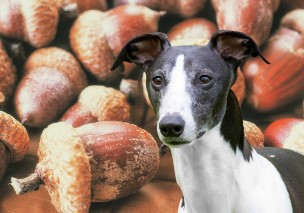No, Dogs should not eat acorns as they can be toxic to them. Acorns contain tannins, which can cause digestive issues and potentially damage dogs’ kidneys.
Ingesting acorns can also pose a choking hazard due to their size and shape. Protecting your dog from acorns is essential to ensure their safety and well-being. Instead, please provide them with a balanced and appropriate diet for their specific dietary needs.
Table of Contents
Toxicity of Acorns To Canines
Acorns are commonly found in parks, forests, and backyards, making them easily accessible to curious canines. However, acorns can be toxic to dogs due to the presence of tannins. Tannins are natural compounds found in acorns that can cause various adverse effects on dogs.
One of the main symptoms of acorn poisoning in dogs is gastrointestinal upset. That can manifest as vomiting, diarrhea, and abdominal pain. Tannins can also irritate the mouth and throat, leading to excessive drooling and gagging in dogs.

If your dog has ingested acorns, monitoring them closely for any signs of poisoning is crucial. Contact your veterinarian immediately if you notice any symptoms or suspect your dog has consumed many acorns.
Remember, prevention is critical when it comes to ensuring the well-being of your furry friend. Keep your dog away from areas where acorns are present and provide them with a safe and healthy diet to avoid any potential risks associated with acorn ingestion.
Can Dogs Eat Acorns?
Acorns may look like tasty snacks to dogs when roaming outdoors, but it is essential to understand that acorns can be quite toxic and should never be considered food for canine consumption.
The primary safety concern with acorns is that they contain tannins, phenols, and gallotannins. When ingested, These compounds irritate the stomach, intestines, and other digestive organs.
Not only can acorns cause gastrointestinal upset, but they can also lead to more severe health issues, such as intestinal blockage or kidney problems.
To protect your dog, ensure they cannot access acorns by clearing them from your yard or keeping your pet on a leash during walks. It is always best to consult your veterinarian if you suspect your dog has ingested acorns or is experiencing any concerning symptoms.
Signs of Acorns Poisoning in Dogs
If your dog eats too many acorns, watch for these signs of acorn poisoning:
- Excessive drooling
- Vomiting
- Diarrhea, potentially with blood
- Abdominal pain
- Lethargy
- Loss of appetite
- Increased thirst
- Pale gums
In severe cases, dogs may experience liver damage, kidney failure, or the shutdown of red blood cell production.
What to Do If Your Dog Eats Acorns
If you catch your pup ingesting acorns or see signs of illness soon after, call your veterinarian immediately. You may need to induce vomiting unless your dog is already exhibiting vomiting or there are other contraindications.
Your vet may recommend activated charcoal to bind and neutralize toxins in the digestive tract before they’re absorbed. They’ll also want to give your dog fluids and medications to control vomiting.
Additional treatment depends on your dog’s symptoms. If substantial acorn ingestion is suspected, your vet will likely want to run tests to check for liver, kidney, and red blood cell changes. With prompt supportive care, dogs can fully recover after acorn toxicity.
However, delayed treatment or large acorn consumption can be fatal. So don’t wait to call the vet if you have any concerns.
Preventing Acorns Poisoning
The best way to keep your dog safe is to prevent them from eating acorns. Here are some tips:
- Clean up fallen acorns in your yard frequently
- Avoid walking dogs near oak trees during fall acorn drop
- Train your dog to “leave it” and redirect with treats
- Supervise your dog when outside to catch and stop acorns from eating
- Use a basket muzzle on walks if your dog persists in eating acorns
Ensuring your yard is clean of fallen acorns and that your dog can’t access large quantities is vital to keeping them safe. Promptly picking up any stray acorns when on walks also reduces the risk.
Identifying Acorn-rich Areas
Acorns are a potential dog hazard, so recognize high-risk zones in outdoor areas. When walking your dog, be mindful of the presence of oak trees, as these are the primary sources of acorns.
Oak trees are commonly found in parks, forests, and wooded areas, so exercise caution in these locations. Watch for fallen acorns on the ground, as they can pose a choking hazard.
During the fall months, when acorns are typically abundant, be especially vigilant to avoid areas with a dense concentration of oak trees. While preventing acorn-rich areas may be challenging, awareness and careful observation can help keep your furry friend safe.
The availability of acorns can also vary depending on the season. Acorns are typically most abundant in autumn when oak trees start to shed their fruits. Be aware of this seasonal fluctuation in acorn availability, as it can affect your dog’s exposure to them.
Symptoms of a Dog Eating Acorns
If your dog manages to eat some acorns, watch for these common symptoms:
- Vomiting: One of the first signs is usually vomiting, which may happen soon after ingestion. Vomit may contain acorn pieces and have a tannin odor.
- Diarrhea: Some dogs develop diarrhea after eating acorns, which may include blood and mucus. Diarrhea can result from irritation and inflammation in the digestive tract.
- Excessive thirst and urination: The toxins in acorns can impact kidney function, leading to increased thirst and urination. Urine may appear dark or bloody.
- Lethargy and weakness: Dogs often become tired and weak as the toxins take effect. They may stop wanting to go on walks or play.
- Loss of appetite: A disinterest in food is common, but severe appetite loss lasting more than a day requires prompt veterinary attention.
- Abdominal pain: Dogs may cry, whine, or act anxious from stomach and abdominal discomfort after eating acorns. They may guard their belly.
- Pale gums: The gums may lose their pink color and appear pale gray or white, signaling anemia from the breakdown of red blood cells.
Training Dogs To Avoid Acorns
Dogs should avoid eating acorns as they can cause various health issues. Training dogs to avoid acorns is crucial for their safety and wellbeing.
Provide your dog with an alternate positive experience when they encounter acorns. That helps redirect their attention away from the acorns and reinforces the behavior you want to see.

One technique is rewarding your dog with a tasty treat or toy when they ignore the acorns. By associating the positive reward with not engaging with acorns, your dog will become more inclined to avoid them.
Instead of allowing dogs to eat acorns, provide them with suitable snack alternatives. Choose dog-friendly fruits and vegetables like apple slices, sweet potatoes, or carrots.
These options are safe for dogs’ consumption and provide them with essential vitamins and minerals. Commercial dog treats specifically designed for dental health can also be a great alternative.
FAQs on Can Dogs Eat Acorns
Can Dogs Eat Acorns?
Dogs should not eat acorns as they can cause digestive issues and potentially harmful blockages.
Why Are Acorns Bad For Dogs?
Acorns can be toxic to dogs as they contain tannins that can cause stomach upset and even kidney damage.
What Are The Symptoms of a Dog Eats Acorns?
If a dog consumes acorns, watch out for symptoms like vomiting, diarrhea, abdominal pain, and loss of appetite.
What Should I Do If My Dog Eats Acorns?
If your dog eats acorns, contact your veterinarian immediately to assess the situation and provide appropriate treatment.
Final Verdict
Acorns can be risky and require caution. But a watchful eye, along with prompt veterinary care if needed, can help keep your dog safe. With some basic precautions, you can allow your dog to enjoy being outside while minimizing the chances of acorn-related problems. Just be sure to contact your vet immediately if you have any concerns after your pup eats acorns.
















